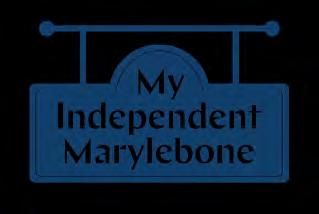38
Strategic report Environment and community Community investment
The Group’s community investment is guided by the principle that our income is generated in Marylebone, and therefore support should be focused largely in the local area. Recognising that there are areas in need just outside the 92 acres of the Estate, we broaden our reach to support neighbouring communities in the City of Westminster. Community investment encompasses our charitable giving, support of local institutions and initiatives, and is aligned with our diversity and inclusion aims. It is also recognised as a contributing factor to enhancing employee engagement. The impact of the pandemic has been devastating, particularly on the most vulnerable in our society. At the same time many charities have been hit hard, especially those dependent on public fundraising. In response to these challenges, Howard de Walden sought to give to those in need and provide relief and resources where they were needed most. Our support is given through charitable and community support contributions (2021: £926,000), fundraising, awareness raising, volunteering, and space in-kind donations. Over the past year, we have supported our community and the vulnerable people within it in a variety of ways. We have seen and heard first-hand how impactful this support has been, and listed below are examples: — Our scholarships allowed two disadvantaged undergraduate students in their final year of studies at the University of Westminster to improve their grades and graduate with a 2.1 and 1st degree respectively. — Our donation to Advance Charity, meant more women and children in Westminster who were at risk of domestic abuse, were sheltered and supported. — Our donations to the local foodbank resulted in less hunger with greater access to food during the pandemic. — Our awareness raising, fundraising and donations for The Hidden Network, a group of charities tackling homelessness in Westminster, meant that more people sleeping rough received the support they needed throughout the winter months. — Our donation to The Felix Project ensured that an additional 61,000 meals were redistributed to people facing food insecurity. — Our colleagues donated 40 toys for a local charity nursery, to ensure kids from disadvantaged backgrounds had a gift at Christmas. — Our community toiletry drive meant that a local shelter was able to put on more showers for homeless people. 38
The Howard de Walden Estate Annual Report 2021
— Our donation to Westminster Wheels, a Westminster City Council initiative, helped unemployed young people into work, taught them new cycle repair skills, encouraged people to donate bikes into the scheme, and promoted cycling in Westminster, helping to improve air quality. — Our donation to the Young Westminster Foundation’s Digital Futures campaign ensured 40 devices were delivered to families in Westminster, along with one year of internet access and training, to help tackle the digital divide and ensure children had online access for home schooling. — A group of eight colleagues presented to 60+ undergraduate students from the University of Westminster as part of their Working Cultures UK Programme, focused on improving employability skills and industry awareness for students. — Two colleagues, Aidan Mckearney and Barry Greenstreet, participated in the LandAid SleepOut, helping raise much needed funds to tackle youth homelessness. Not only did they raise £7,416 by sleeping rough, they also helped raise awareness by promoting the sleep-out with colleagues, businesses and personal contacts. They ended up being the third largest fundraisers in London. — Our £100,000 donation to our local NHS hospital, University College Hospital, London (UCLH), has supported a clinical research project for the long-COVID-19 clinic. By supporting two research fellows, it will help develop innovative diagnostic pathways and evaluate treatment strategies. It has also gifted 50 frontline workers and their families a physical and mental reprieve, with time away from the hospital to recoup and reflect on the year gone by. Key worker housing Our support also extended to offering discounted housing to key medical workers at local hospitals. Central London residential properties can be expensive to many and we are conscious that some key medical staff who work in the area are unable to afford to live here. To achieve this, we have been running our own defined housing programme since late 2019 to enable key workers from local hospitals to make Marylebone Village their home as well as their place of work. The scheme provides a mix of flats rented out at subsidised values to successful applicants. At the end of the year we had ten properties (2020: eight) let to key medical workers at an average discount to market rent of 55% (2020: 54%) which equates to £143,000 (2020: £64,000) of rent foregone in the financial year.









